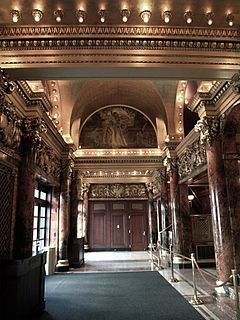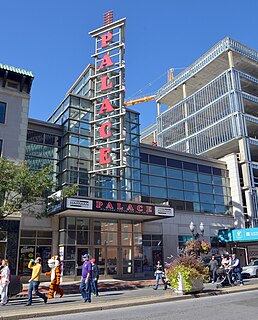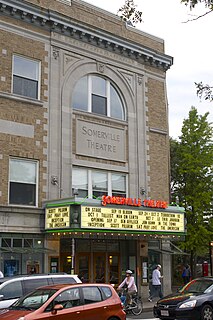


Strand Theatre is a restored vaudeville house located in Uphams Corner in Dorchester, Massachusetts. It is owned by the City of Boston and managed by the Mayor's Office of Arts and Culture.



Strand Theatre is a restored vaudeville house located in Uphams Corner in Dorchester, Massachusetts. It is owned by the City of Boston and managed by the Mayor's Office of Arts and Culture.
The Strand was built in 1918 as a movie and vaudeville house. It opened on the evening of Armistice Day -- November 11, 1918 -- billed as Dorchester's million dollar movie palace, with a double feature: Queen of the Sea, starring Annette Kellermann, and Out of a Clear Sky, starring Marguerite Clark, with extra added attraction Miss Emilie Earle, the songstress de luxe. [1] The theater was designed by Funk and Wilcox in Boston and built by McGahey and O'Connor. The theater boasted the first theater organ in New England, which reportedly cost $75,000.
It closed in 1974 due to disrepair, only to be reopened again in 1979 after the city of Boston made extensive renovations. The Strand was re-christened the M. Harriet McCormack Center for the Arts, named after the wife of Massachusetts Senator John W. McCormack. Both McCormack and his wife were ardent supporters of the arts. The McCormack Center opened with a series of jazz concerts, including the Duke Ellington Orchestra, Count Basie and His Orchestra, and Dizzie Gillespie. In the early 1980's it featured a series of dance concerts, including regular performances by North Atlantic Ballet. It hosted Chaminade Opera Group in 1990 under the direction of Florence Louise Pettitt.
In 2005, the Strand closed for six months for repairs, including upgrading the electrical switch gear, replacing 300 seats in the orchestra section, and cleaning and repairing the remaining 1,100 seats. These repairs were made in part by a $6 million, four-year capital investment from the city of Boston. In March 2006, the Strand closed its doors again for more improvements, including upgrading the safety and fire systems and renovating the box office and dressing rooms. In July 2008, the Strand's stage floor and orchestra pit were replaced and repairs were made to the facade and marquee. [2] On January 9, 2007, Mayor Thomas Menino gave his State of the City Address from the stage of the Strand Theatre to help bring attention to restoration efforts and help revive the Strand's prominence in the city of Boston. [3]
In August 2014, "a newly renovated visual arts gallery" opened with an exhibit it honoring black veterans. [4]

The Cutler Majestic Theatre at Emerson College, in Boston, Massachusetts, is a 1903 Beaux Arts style theater, designed by the architect John Galen Howard. Originally built for theatre, it was one of three theaters commissioned in Boston by Eben Dyer Jordan, son of the founder of Jordan Marsh, a Boston-based chain of department stores. The Majestic was converted to accommodate vaudeville shows in the 1920s and eventually into a movie house in the 1950s. The change to film came with renovations that transformed the lobby and covered up much of John Galen Howard's original Beaux-Arts architecture.

Thomas White Lamb (1871–1942) was a Scottish-born, American architect. He is noted as one of the foremost designers of theaters and cinemas in the 20th century.

Paramount Theatre is a theatre in Boston on Washington Street, between Avery and West Streets.

The Palace Theatre in downtown Stamford, Connecticut, United States, comprises two facilities on Atlantic Street: the restored Palace Theatre, and the Rich Forum, both within four blocks of each other:

The Orpheum Theatre, a 2,308-seat venue listed on the National Register of Historic Places, is located in downtown Memphis, Tennessee, on the southwest corner of the intersection of South Main and Beale streets. The Orpheum, along with the Halloran Centre for Performing Arts & Education, compose the Orpheum Theatre Group, a community-supported nonprofit corporation that operates and maintains the venues and presents education programs.

The Boston Music Hall was a concert hall located on Winter Street in Boston, Massachusetts, with an additional entrance on Hamilton Place.

The Somerville Theatre is an independent movie theater and concert venue in the Davis Square neighborhood of Somerville, Massachusetts, United States. Over one hundred years old, the Somerville Theatre started off as a vaudeville house and movie theater. The theater has since transitioned and now operates as a live music venue and first-run movie theater. As a music venue, the theater has played host to many historic concerts, including the first of the two Last Dispatch concerts, two shows by Bruce Springsteen in 2003, and a performance by U2 in 2009. Recent live performances have included Ryan Adams & the Cardinals, Cursive, Norah Jones, The Jonas Brothers, Joan Baez, and the John Butler Trio.
The Boston Center for the Arts (BCA) is a 501(c) nonprofit visual and performing arts complex in the South End neighborhood of Boston, Massachusetts. The BCA houses several performance and rehearsal spaces, restaurants, a gallery, the headquarters of the Boston Ballet, the Community Music Center of Boston and several other arts organizations. The BCA also serves as home to four Resident Theater Companies and a number of artists. The BCA's main building, the Cyclorama, is on the National Register of Historic Places. Boston Ballet's headquarters was designed in 1991 by architect Graham Gund.

The Cabot Performing Arts Center is located at 286 Cabot Street in Beverly, Massachusetts.

The Saenger Theatre is a historic theater and contributing building to the Lower Dauphin Street Historic District in Mobile, Alabama. It was dedicated in January 1927. The Saenger Theatre is a Mobile landmark, known for its architecture and ties to local cultural history. The theater has been completely renovated in recent years with an upgraded electrical system, VIP facilities, new stage rigging and sound system. It is the official home of the Mobile Symphony Orchestra and also serves as the venue for movie festivals, concerts, lectures and special events.

The historic, 1,100-seat Miller Symphony Hall is the premier performing arts facility in Allentown, the largest city in Pennsylvania's Lehigh Valley. The hall was previously known as Central Market (1896), Lyric Theater (1899), and Allentown Symphony Hall (1959). In 2012 it was renamed for the Miller family, longtime owners of the hall and of The Morning Call newspaper.

The Imperial Theatre is an 853-seat theater located in downtown Augusta, Georgia, United States. The theater opened on February 18, 1918. It is named after the Imperial Theatre in New York City.

Uphams Corner, or Upham's Corner, is a commercial center in Dorchester, the largest neighborhood of Boston, Massachusetts. The intersection of Dudley Street/Stoughton Street and Columbia Road is the heart of Uphams Corner, and one of Dorchester's main business districts.

The Orpheum Theatre is a music venue located at 1 Hamilton Place in Boston, Massachusetts. One of the oldest theaters in the United States, it was built in 1852 and was originally known as the Boston Music Hall, the original home of the Boston Symphony Orchestra. The concert hall was converted for use as a vaudeville theater in 1900. It was renamed the Orpheum Theatre in 1906. In 1915, the Orpheum was acquired by Loew's Theatres and substantially rebuilt. It operates as a mixed-use hall, primarily for live music concerts.

The Hanover Theatre for the Performing Arts in Worcester, Massachusetts, United States was originally built in 1904 as the Franklin Square Theatre regularly scheduling burlesque shows, Broadway touring shows and headline acts transitioning to showing silent films by 1912 when vaudeville magnate Sylvester Poli purchased the theatre from the estate of Pauline L. Taylor.

The Majestic Theatre is a performing arts theater in the City Center District of Downtown Dallas. It is the last remnant of Theater Row, the city's historic entertainment center on Elm Street, and is a contributing property in the Harwood Street Historic District. The structure is a Dallas Landmark and is listed on the National Register of Historic Places.

The Victory Theatre is a theater in Holyoke, Massachusetts. It was built in 1920 by the Goldstein Brothers Amusement Company. The architecture is in the Art Deco style and is considered the last of its type between Boston and Albany. Closed for nearly four decades, as of November 2018 its owners, the Massachusetts International Festival of the Arts (MIFA), were in the process of obtaining permits and meeting construction contractors for renovation; by January 2019 the MIFA Victory Theatre group had its final architectural plans approved by the city planning board, along with construction fencing and signage special permits, with a goal of opening the theater by its 100th anniversary on December 20, 2020.

The Boston Opera House, also known as the Citizens Bank Opera House, is a performing arts and esports venue located at 539 Washington St. in Boston, Massachusetts. It was originally built as the B.F. Keith Memorial Theatre, a movie palace in the Keith-Albee chain. The chain became part of RKO when it was established just before the theater opened on October 29, 1928, and it was also known as the RKO Keith's Theater. After operating for more than 50 years as a movie theater, it was rededicated in 1980 as a home for the Opera Company of Boston, which performed there until the opera company closed down in 1990 due to financial problems. The theater was reopened in 2004 after a major restoration, and it currently serves as the home of the Boston Ballet and also hosts touring Broadway shows. The theater serves as the home arena of the Boston Uprising of the Overwatch League.
The RKO Boston Theatre was a movie theatre in Boston, Massachusetts, located at 616 Washington Street, near Essex Street in the Boston Theater District. It opened as the Keith-Albee Boston Theatre on October 5, 1925.
The National Theatre (1911-1978) of Boston, Massachusetts, was a 3,500-seat multipurpose auditorium on Tremont Street in the South End. It functioned as a cinema, lecture hall, and stage. Performers included Jehovah's Witness founder Joseph F. Rutherford and "big-name entertainers like Duke Ellington and Ray Bolger." Movie screenings included The Battle of Gettysburg in 1913. The English High School held graduation exercises in the National. Around 1919 it was known as the "Waldorf Theater." In 1992, it was purchased by Philip Smith.
| Wikimedia Commons has media related to Strand Theatre (Dorchester, Massachusetts) . |
Coordinates: 42°18′57.5″N71°3′57.7″W / 42.315972°N 71.066028°W